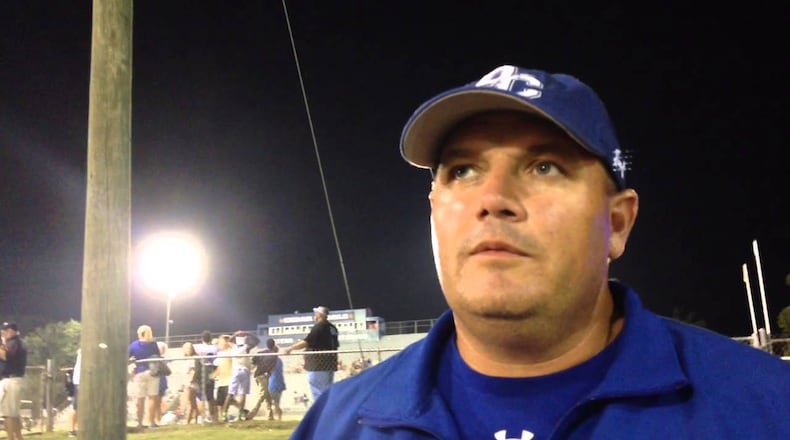Believing their voice within the GHSA has weakened in recent years, Georgia’s high school football coaches are forming a new organization. Two years in its evolution, it’s called the Georgia High School Football Coaches Association.
It met last month in Macon for a coaching clinic, to revise bylaws and to broaden what had been a smaller group of head coaches to include all high school coaches in the state. Membership, now about 100, could reach well over 1,000. At least that’s the goal, said Oconee County football coach Travis Noland, the GHSFCA’s president.
“The purpose is to provide a unified voice for Georgia’s football coaches,” Noland said. “We don’t have a specific agenda. It’s not like we’re ready to attack this or that, but there have been things that have come down over the past 10 years like practice limitations and rule changes that we had no idea they were even being discussed. I’m not saying those decisions were bad. We’d just like more of a heads up and a say in it because it affects our livelihood.”
Other issues frequently debated among football coaches include rules regarding spring practice and summer and preseason camps, the number of scrimmages allowed, start dates for fall practice, the sites and financial payouts for playoffs and state finals, transfer eligibility, concussion protocols and heat regulations and the assignment and evaluation of officials.
Noland says that the declining influence of football coaches is a trend. For years, football coaches were often their schools’ athletic directors. A generation ago, Georgia football coaching icons such as Robert Davis of Warner Robins, Jim Hughes of Colquitt County and Larry Campbell were setting agenda as GHSA committee chairmen and voting members of the GHSA’s executive committee. Dave Hunter, Ed Pilcher and Rodney Walker were other powerful football coaches whose influence was strong in the GHSA until they recently retired.
This academic year, only two head football coaches were serving on the GHSA’s 68-member executive committee – Kevin Kinsler of Northside-Warner Robins and Ulysses Hawthorne of Beach. Both retired from their schools this off-season.
Blessed Trinity coach Tim McFarlin, one of the GHSFCA’s founders, said more and more football coaches have relinquished roles as athletic director and GHSA volunteers as their primary jobs have become more demanding. Football has become nearly a year-round sport while athletic directors are overseeing an increasing number of sports and sports teams.
“Just in the last 10 years, our plates [as head football coaches] have gotten too full,” McFarlin said. “Head football coach and athletic director are two full-time jobs. This is in no way a negative thing toward athletic directors. You want the best administrator in that role. But because of that, it’s up to us to take more responsibility for our sport. We’re just trying to make the sport better.”
Noland was part of a similar football coaches organization in North Carolina, his native state, while coaching there. Tennessee, Alabama and Texas have associations for their football coaches. Most still do not, or they operate under a broader group of all-sports coaches.
The Georgia Dugout Club has served a similar advocacy role for baseball and softball in the state. The Georgia High School Golf Coaches Association is another for its sport. But most other sports, including basketball, don’t have anything comparable in Georgia.
Noland said that the football group, which operates as a subsidiary of the all-sports Georgia Athletic Coaches Association, plans to kick off a membership drive on April 1. For $75, coaches will have membership in both the GHSFCA and the GACA, voting rights in the GHSFHA and $2 million in liability insurance.
The February coaching clinic brought in successful Georgia coaches, some current, some former, such as John Reid of Rome, Dexter Wood of Buford, Paul Etheridge of Marist and Jeff Herron, now of Tennessee Tech. College coaches from Mercer and Samford also attended and spoke.
Coincidentally, McFarlin and Noland were opposing coaches in the Class AAAA championship game that Blessed Trinity won last season. The two had been working on the coaches organization and building a friendship for long before that.
But their experience in the finals reinforced their idea that football coaches need more say. Neither of their schools made the money they expected for their schools, partly because of an attendance drop of 39 percent — to 28,011 from 45,605 — from the previous season.
Rain was a culprit, as the GHSA moved outdoors to less expensive Georgia State Stadium from the indoor Mercedes-Benz Stadium.
Neither Noland or McFarlin has an official position on the ideal host site or the financial distribution, but they agree it’s an example of an issue that football coaches want to influence.
“These high schools deserve the opportunity to make as much money as they can when they have a state-championship opportunity,” McFarlin said. “There is a real concern about the diminishing payout. The percentage going to schools is less and less, and we have to address that. These are personal issues with me, not our organization, but these are the kinds of discussions we’re having.”
And those concerns are better expressed as a united group than as a single coach, both agreed.
“If we wanted to add five days of spring football practice — that’s not something that’s been discussed; I’m just giving an example — but if we could go to the GHSA and say the GHSFCA voted unanimously to endorse extending spring football to 15 days, then they’d know how strongly we felt about something,” Noland said. “We’re trying to get a stronger voice for our game.”
About the Author
The Latest
Featured

